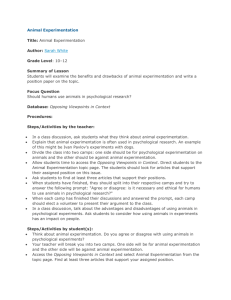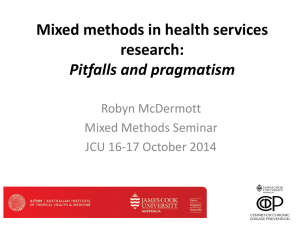The French Youth Experimentation Fund Fonds d*expérimentation
advertisement
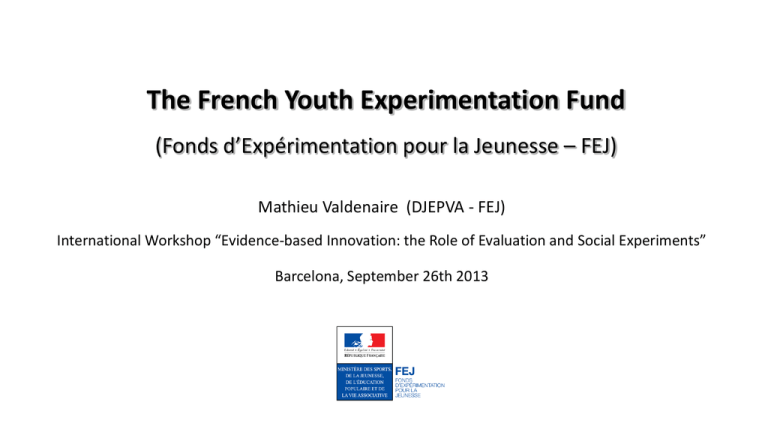
The French Youth Experimentation Fund (Fonds d’Expérimentation pour la Jeunesse – FEJ) Mathieu Valdenaire (DJEPVA - FEJ) International Workshop “Evidence-based Innovation: the Role of Evaluation and Social Experiments” Barcelona, September 26th 2013 Overall objectives • Started in 2009, the fund main goals are: • To promote student achievement; • To improve social and professional integration of young people (under 25 year old). • Original experimentation agenda set by a commission on youth policy, including all stakeholders • The fund aims at inspiring evidence-based policies related to youth by: • Promoting and supporting innovative local initiatives; • Rigorously assessing their implementation and impact to prove their efficacy before deciding whether it should be scaled up. 2 Funding and organization • Funded by a public-private partnership: • • • • French central government (Ministry of Youth) Private partners, such as the Total Foundation Overall budget of 163 million euros between 2009 and 2013… … of which 24 million are dedicated to evaluation • Organization of the Fund • Board of Directors which includes representatives of public and private partners: defines thematic priorities and decides on the allocation of funds • Scientific committee: issues recommendations about experimentation fields and evaluation methods • Dedicated team at the national Ministry of Youth: manages the fund and monitors the experiments 3 Actors of the experiments • Who are the experimenters? • Project leaders: Associations, Local governments, Public institutions, Schools, Training centers and universities, Chambers of commerce, etc. • Evaluation teams: Research centers, Academics, Private consultants • The emergence of experimental projets: bottom-up and top-down schemes • Each project is evaluated by an independant evaluation team - evaluation is 100% funded by the FEJ • Project developers and evaluators are jointly responsible for insuring that the intervention is evaluated in a way that makes it possible to measure the impacts of the project 4 Key figures Between April 2009 and September 2013: • 16 calls for proposals • Over 1700 candidates' applications • 554 projects covering a large range of topics • 295 evaluation reports expected • Average length of experimentations ≈ 2 years • 498 000 young people beneficiaries of those actions 5 Evaluation methods: principles • Necessity of identifying and measuring the effects of experimental policies on beneficiaries: requires rigorous evaluation protocols • Not only outcome monitoring, but identification of the changes in outcomes that are directly attributable to the program • This raises classical evaluation problems, i.e. confusion between correlation and causality • Counterfactual analysis: how would outcomes of participants have changed if the intervention had not been undertaken? • Emphasis on impact evaluations including a control group, preferably with random assignment (RCTs) • Qualitative methods are also used: • Quantitative evaluation methods and RCTs are not feasible for all projects, especially small scales ones; • Quantitative methods do not allow to answer all relevant questions. 6 Evaluation methods: first lessons of experience • Evaluation issues have to be discussed before the implementation of the projects: • Randomization • Work induced by the experiment on the field • Need to assure absence of compensation for members of control group members: access to usual policies only • Treatment has to be precisely described • Like every evaluation method, RCTs require advanced research skills to: • Design a valid evaluation protocol • Monitor surveys (importance of response rates, especially among the control group), secure access to individual data • Perform econometric treatments, robustness checks etc. • A complementary between quantitative et qualitative results? 7 Capitalizing on experimental results • Generalization of experimental projects • Example: Awareness Campaigns for Parents of Middle School Students • An exception more than a general case • Experiments allow to learn not only on a project, but on a public policy instrument • External validity issues: • Voluntary participation to social experiments • Awareness of participation in an experiment and potential biases • General equilibrium effects • Results need to be interpreted • Need for dialogue between policy-makers and researchers that evaluate projects • Experiments are also a way to ease this dialogue 8 Thanks for your attention For more information, visit http://www.experimentation.jeunes.gouv.fr/ (in French…) 9



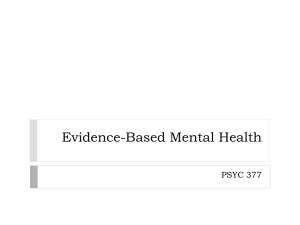
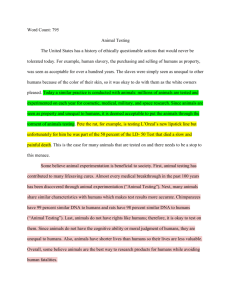
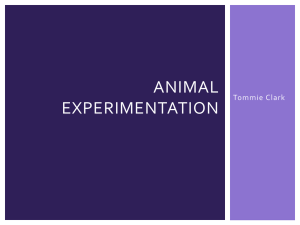

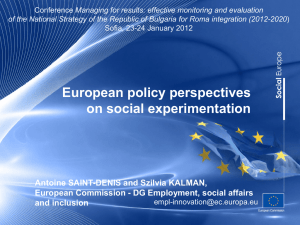
![Gunning presentation [PPTX 699.68KB]](http://s2.studylib.net/store/data/014976236_1-85e3268015b810d2235568b8329b35de-300x300.png)
